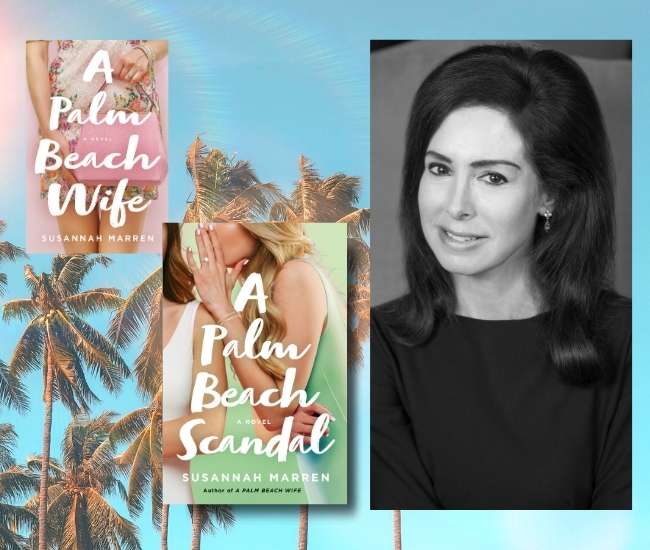“Why are women stereotyped, expected to be ‘good girls’ who do the right thing? Why do they compete for the glittering prizes? At what price do women question these societal expectations?”
Talking to Susannah Marren about her latest work, A Palm Beach Scandal, it’s easy to get caught up in her entrancing story set in the elite world of privilege. Yet Marren believes her work inspires women to ask important questions. Read our full review of the novel here.
“Why are we taught that motherhood is the answer, that marriage makes us whole, that materialism is the path to happiness? What do we owe ourselves in terms of our truth and where will it take us?”
In this recent Q&A, Marren delved deeper into her work and the crazy world in which it is set.
Q: Palm Beach has been part of your life for a long time. Please share an early memory of visiting there.
A: I remember being on Worth Avenue with my mother — I was about seven or eight. We were shopping for books, and she bought me a fancy bathing suit. I wore it the next day to the beach with my friends, and two of them then bought the same one. My mother assured me that imitation was the sincerest form of flattery, but I didn’t believe her. Especially in Palm Beach, where I watched her strive to be unique and possibly the chicest.
Q: Which aspects of Palm Beach culture make it such a good fit for the types of issues and ideas that you like to write about?
A: My life’s work has been on how a diverse group of women feel as mothers, daughters, wives, widows, divorcees, sisters, coworkers, rivals, mothers-in-law, daughters-in-law, lovers. Because Palm Beach is beautiful with great privilege, we assume that women do not struggle there. However, much is at stake in terms of deception; the sense of having to measure up is critical. I wanted to dig deep into the lives of two adult sisters and their mother in Palm Beach. How these women deal with marriage and family in a place where appearances are a guiding force. The perfection of Palm Beach reminds us that issues of acceptance and survival can affect women anywhere.
Q: How did you develop the characters of the sisters Elodie and Aubrey? Did you always know that they would have strongly contrasting personalities?
A: The sister bond is compelling and complex. After I researched and wrote a nonfiction book on sisters, I realized that those of us who are without a sister are in search of a “sister-like” friend. Those with sisters aren’t as invested in female friends; they have one another. When sisters are on the outs or have serious issues, there is tremendous loss. From the start of my novel, I applied this to the relationship that Elodie and Aubrey share. They are devoted, and at the same time their styles are disparate, and there has been friction in their past.
Q: You have strong roots in Long Beach Island, NJ, and in New York City. Have you considered either place as a setting for a novel?
A: My strong roots are in three places: Long Beach Island, New York City and Palm Beach. I would call all three home, and they are very distinctive. Long Beach Island is a beachy, 18-mile-long barrier island off the New Jersey coastline; New York is dynamic, diversified and a very large city; and Palm Beach is, as I write in the novel, alluring and elegant. I am working on two new projects and these settings are there. They’re important; they resonate with me.
Q: What is your next project?
A: At the moment, I’m writing a novel and outlining another. Again, multigenerational narratives because the journey for women of all ages is endlessly intriguing to me.
https://booktrib.com/wp-content/uploads/2020/10/813XQKbq17L-200×300.jpg
About Susannah Marren:
Susannah Marren is the author of Between the Tides and A Palm Beach Wife and the pseudonym for Susan Shapiro Barash, who has written over a dozen nonfiction books, including Tripping the Prom Queen, Toxic Friends and You’re Grounded Forever, But First Let’s Go Shopping.
For over twenty years she has taught gender studies at Marymount Manhattan College and has guest taught creative nonfiction at the Writing Institute at Sarah Lawrence College. She lives in New York City.




